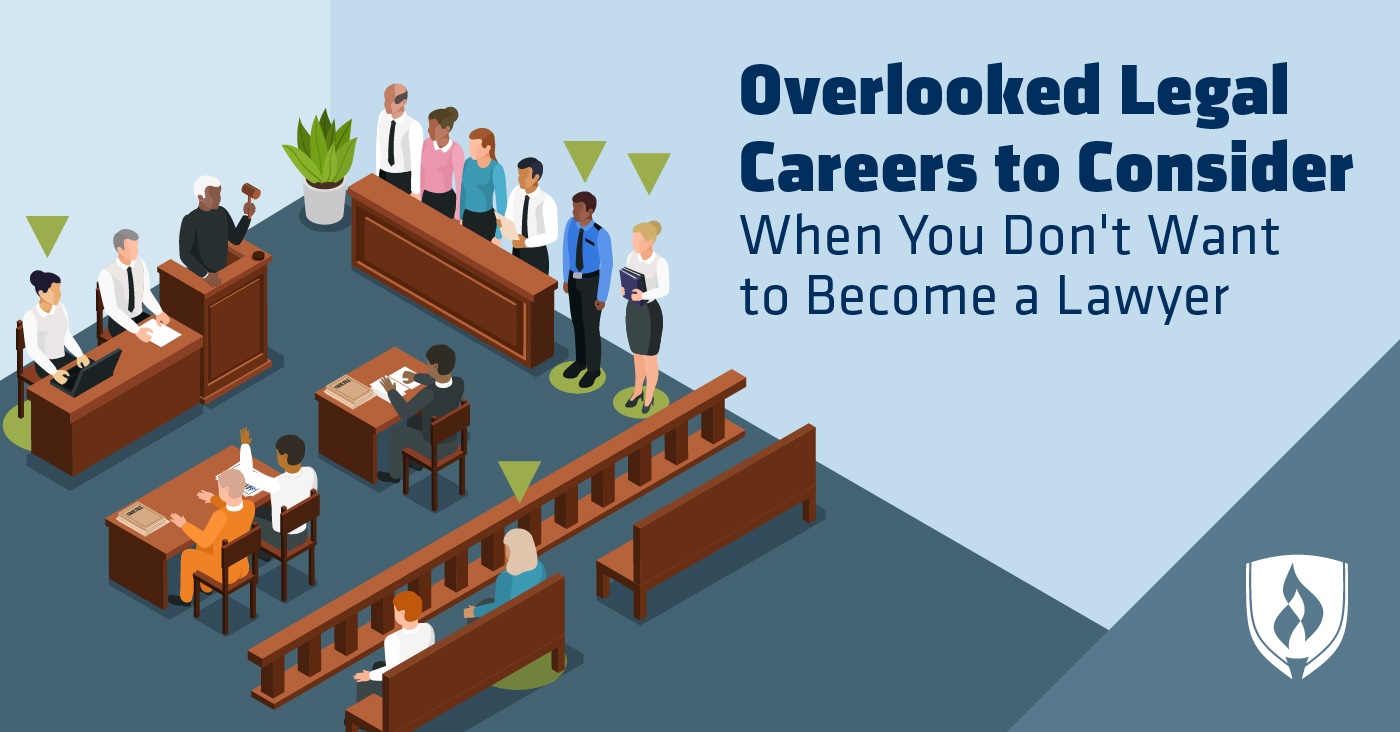6 Overlooked Legal Careers to Consider When You Don't Want to Become a Lawyer
By Callie Malvik on 08/31/2020
You’re almost always up for watching a Law and Order rerun and can’t seem to get enough of the high-stakes drama unfolding in courtroom scenes. Seeing the details of each case progress and watching the justice system run its course never gets old for you. While you obviously find the inner workings of the criminal justice system intriguing, you can’t see yourself spending years in school to become a lawyer.

But now as you’re considering other potential career moves, you’re wondering, “Are there any legal careers that don’t require a law degree?” The good news for you is that this is definitely the case.
That’s right, you don’t have to go through the ringer of law school to join the ranks of the professionals who make up our justice system. Learn more about some lesser known legal careers that could get you working inside the courtroom. If you're considering a career in law enforcement, take a closer look at the distinctions between "Correctional Officer vs. Police Officer" to determine which role suits you best.
6 Legal careers that don’t require a law degree
Looking for the inside scoop on some often overlooked legal careers? Start your search with these six options.
1. Paralegal
Paralegals are the valuable support team behind every successful lawyer. These legal professionals are privy to all the inside details of a case. They conduct legal research, summarize information, gather and organize evidence and offer any other assistance a lawyer may need in preparing for trial. If you think a pile of research looks like a fun challenge and you’ve always wanted to be in the know about interesting cases, this is one legal career you’ll want to consider.
How to become a paralegal: Earn an Associate’s degree in Paralegal Studies, or obtain a bachelor’s degree in a related field and complete a Certificate in Paralegal Studies.
2. Bailiff
Bailiffs (sometimes called marshals or court officers) are responsible for keeping everyone safe and secure in the courtroom. They provide general courtroom security, as well as deliver court papers to the judge, escort the jury in and out of the courtroom and enforce any other courtroom rules or mandates from the judge. These law enforcement officers have authority from the judge to do what they need to in order to keep order and safety inside the courtroom.
How to become a bailiff: Becoming a bailiff requires a high school diploma, as well as additional training to learn the ins and outs of court procedures. Higher courts may require additional work experience or education, such as a degree in Criminal Justice.
3. Mediator
Sometimes opposing parties want to settle a dispute outside of court, but they need a little outside help. That’s where a mediator comes in. Mediators are neutral parties who meet with disputing parties in a private hearing outside of court. They help them maintain a civilized discussion and work to guide both sides toward an agreement that works for everyone. These legal pros are excellent communicators who negotiate to make sure everyone’s needs are accounted for during the settlement process.
How to become a mediator: Requirements for becoming a mediator vary by state, though most require 20 to 40 hours of training and working under an experienced mediator until they have gained adequate experience.
4. Court reporter
Court reporters produce word-for-word transcriptions of court cases and hearings. It’s their job to document the legal proceedings and provide an accurate record of what occurs within the courtroom. Court reporters must possess an eye for detail. They record the actions and gestures of those in the courtroom in addition to spoken dialogue, and they’re responsible for clarifying testimony that was hard to understand. They also organize transcriptions and edit them for typos.
How to become a court reporter: Most states require court reporters to be licensed by a professional association, such as the National Court Reporters Association. Some may also achieve a certificate or associate degree in court reporting.
5. Probation officer
Probation officers work with offenders who have been released on probation to give them the best chance at success as they readjust to everyday life. They assist with job training, administer drug tests and provide resources for substance abuse rehabilitation. Through all of this, they must maintain reports documenting their probationers’ progress. They meet regularly with their probationers and their families to ensure they’re staying on track and to offer additional support as needed.
How to become a probation officer: Most probation officers have a bachelor’s degree in Criminal Justice or a related field. They must also be able to pass a background check and drug testing.
6. Court clerk
Court clerks are responsible for a variety of clerical duties within the courtroom. They prepare the docket of cases each day, record case dispositions and collect and process payment for court fees. They also contact witnesses, attorneys and litigants to share and obtain information for court cases.
How to become a court clerk: There is no standard educational requirement for court clerks. Many small courts only require a high school diploma, along with on-the-job training. Some courts will prefer an associate degree in Criminal Justice or a related field. Federal courts typically require master’s or law degrees.
Which legal career is your calling?
As you can see, legal careers aren’t just for lawyers. You have plenty of options for a successful career that takes you inside the legal system you love while taking advantage of your natural skills and interests.
If you’ve ever dreamed of life as a lawyer, becoming a paralegal may be the next best thing. Learn more about the ins and outs of the job in our article, “What I Wish I Knew Before Becoming a Lawyer.”
Check out our other article, "What is a Crime Victim Advocate? The Journey to Justice Has a Guide".
Related Articles:
- Should I Be a Criminal Justice Major? Everything You Need to Know to Decide
- 9 Types of Criminal Investigations You Could Encounter as a Police Detective
- What Does a Court Clerk Do and How Do You Become One?
- Cracking Cases with Digital Forensics
1Bureau of Labor Statistics, U.S. Department of Labor, Occupational Employment Statistics, [data accessed July 2020] www.onetonline.org. Data represents national, averaged earnings for the occupations listed and includes workers at all levels of education and experience. Employment conditions in your area may vary.
EDITOR’S NOTE: This article was originally published in 2016. It has since been updated to include information relevant to 2020. Rasmussen College does not offer programs to prepare students for every occupation profiled in this article. Please visit www.rasmussen.edu/degrees/justice-studies/ for a list of the programs we offer..
The Criminal Justice Leadership and Management Bachelor’s degree and Criminal Justice Associate’s degree programs at Rasmussen College have not been approved by any state professional licensing body, and the programs do not lead to any state-issued professional license. For further information on professional licensing requirements, please contact the appropriate board or agency in your state of residence. Additional education, training, experience, and/or other eligibility criteria may apply.
In Minnesota, the Criminal Justice Associate’s degree program does not meet the standards established by the Minnesota Peace Officer Standards and Training Board for persons who seek employment as a peace officer.




